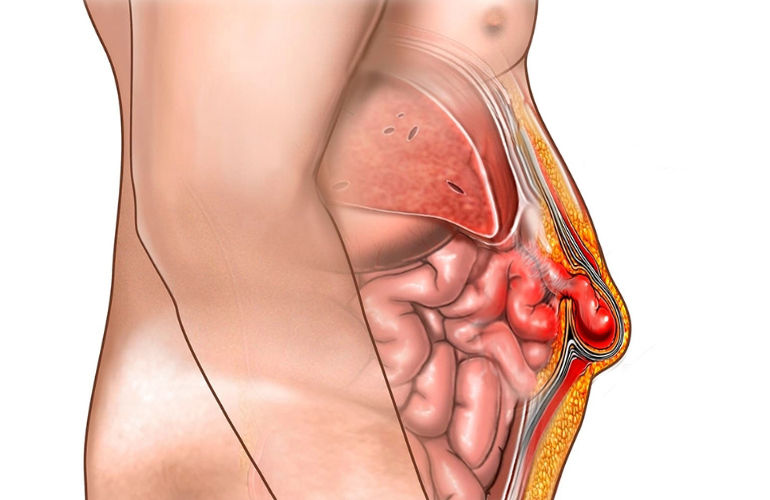There are several types of abdominal wall hernias, each classified based on their location and cause:
Inguinal Hernia: The most common type, occurring when intestines push through a weak spot in the lower abdominal wall, often in the inguinal canal.
Umbilical Hernia: Occurs near the belly button or umbilicus, where part of the small intestine passes through the abdominal wall.
Incisional Hernia: Develops through a scar from a previous abdominal surgery.
Femoral Hernia: Less common and more frequent in women, this hernia appears just below the groin.
Epigastric Hernia: Occurs between the belly button and the lower part of the rib cage in the midline of the abdomen.
Hiatal Hernia: Involves the stomach pushing up through the diaphragm, though not visible from the outside, it's technically a type of abdominal hernia.
Symptoms of an abdominal wall hernia can vary depending on the type and severity but generally include:
Visible Bulge: One of the most common signs, especially noticeable when straining or standing up.
Pain or Discomfort: Pain at the site of the hernia, which may worsen with activity or lifting heavy objects.
Swelling: The area around the hernia may be swollen or feel tender to the touch.
Gastrointestinal Symptoms: Such as nausea, heartburn, or bowel obstruction in severe cases.
Surgery is the only definitive treatment for abdominal wall hernias. Options include:
Open Hernia Repair: The surgeon makes an incision near the hernia, pushes the protruding tissue back into the abdomen, and then sews the weakened area, often reinforcing it with synthetic mesh.
Laparoscopic Hernia Repair: This minimally invasive approach uses small incisions, a camera, and surgical tools to repair the hernia with less damage to surrounding tissues. Recovery times are typically shorter with this method.
Both procedures aim to provide a permanent solution to prevent hernia recurrence and relieve symptoms associated with the hernia.
Turkey is known for its high standards in medical procedures at competitive prices, making it a popular destination for medical tourism, including abdominal wall hernia surgery. Here’s why many choose Turkey:
Cost-Effective: Surgical treatments in Turkey are often more affordable than in many Western countries, without compromising on quality.
Quality of Care: Many hospitals in Turkey are accredited by international organizations such as JCI (Joint Commission International).
Experienced Surgeons: Turkish surgeons are highly skilled and often have a lot of experience in both conventional and laparoscopic hernia surgeries.
Comprehensive Care Packages: Many medical facilities offer packages that include all aspects of the surgery, post-operative care, and sometimes even accommodations and transfers for international patients.
Patients considering surgery in Turkey should research thoroughly to choose accredited facilities and qualified surgeons. They should also consider recovery time and potential follow-up care needs when planning their medical trip to Turkey.
